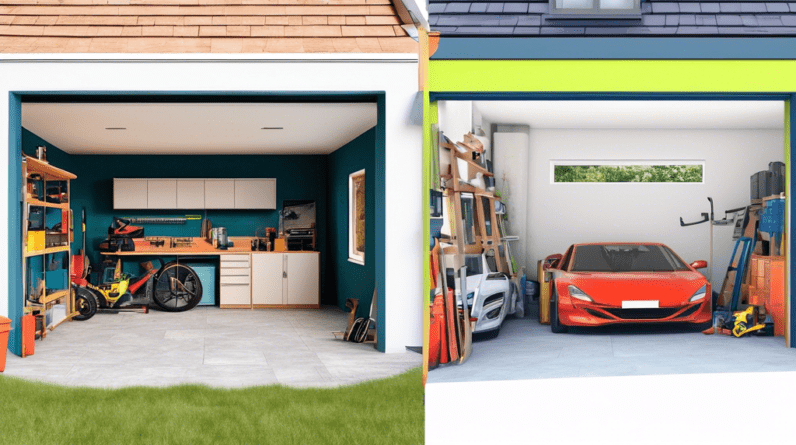
Transform Your Garage: Unlocking the Cost of a Garage to Guest House Conversion
Understanding the Appeal: Why Convert Your Garage?
The allure of a garage conversion is undeniable. Imagine transforming that underutilized space into a charming guest house, a private haven for visitors or even a source of rental income. It’s a brilliant way to add value to your property and enhance your lifestyle.
However, before you envision cozy evenings in your newly renovated space, it’s crucial to understand the financial commitment involved. Garage conversions, while rewarding, require meticulous planning and a realistic budget. This comprehensive guide delves deep into the intricacies of garage to guest house conversion costs, equipping you with the knowledge to make informed decisions.
Factors Influencing Conversion Costs: Decoding the Price Tag
No two garage conversions are identical, and your project’s final price tag will hinge on a multitude of factors. Grasping these variables empowers you to tailor your vision to your budget:
1. Size Matters: Square Footage and Its Impact
Logically, a larger garage translates to a more spacious guest house, but it also means higher costs. The square footage directly affects material quantities, labor hours, and ultimately, the overall budget.
2. Location, Location, Location: Regional Cost Variations
Construction costs, like most things, are subject to geographic variations. Labor and material prices fluctuate across regions, influencing your project’s bottom line. Urban areas often come with higher price tags compared to rural settings.
3. Existing Structure: Assessing Your Garage’s Foundation
The condition of your existing garage plays a pivotal role in determining costs. A structurally sound garage with a solid foundation will require less extensive (and expensive) work compared to one needing significant repairs or reinforcement.
4. Permitting and Regulations: Navigating Local Requirements
Permits are non-negotiable, and their cost varies based on your location. Moreover, adhering to local building codes and regulations might necessitate modifications, impacting your budget.
5. Professional Expertise: The Value of Experience
DIY enthusiasts might be tempted to tackle the conversion themselves, but for most, enlisting professionals is recommended. Costs for architects, contractors, electricians, and plumbers contribute significantly to the overall expenditure.
6. Material Selection: Balancing Aesthetics and Budget
From flooring to fixtures, the materials you choose dramatically impact the cost. Opting for high-end finishes will elevate the aesthetics but also increase the budget. Striking a balance between quality and affordability is key.
7. Essential Amenities: Prioritizing Needs vs. Wants
A functional guest house requires essential amenities like a bathroom and kitchenette. Adding extras like a full kitchen, laundry facilities, or advanced entertainment systems will undoubtedly escalate the cost.
Breaking Down the Costs: A Closer Look at Budget Allocation
To provide a clearer picture, let’s break down the typical cost distribution for a garage to guest house conversion:
1. Design and Planning: Laying a Solid Foundation (5-15%)
This initial phase, often overlooked, is crucial for a successful conversion. Hiring an architect or designer to create detailed plans, ensure code compliance, and obtain permits is an investment worth considering.
2. Structural Modifications: Ensuring a Solid Structure (15-25%)
Depending on your existing garage’s condition, you might need to reinforce the foundation, add walls, or modify the roofline. These structural changes contribute significantly to the overall cost.
3. Plumbing and Electrical: Essential Utilities (10-20%)
Installing plumbing for a bathroom and possibly a kitchenette, along with upgrading the electrical system to handle the increased load, constitutes a substantial portion of the budget.
4. Insulation and Drywall: Creating a Comfortable Haven (10-15%)
Proper insulation is crucial for a comfortable living space, while drywall forms the interior walls and ceilings. The type and quality of insulation and drywall chosen influence the cost.
5. Flooring, Paint, and Fixtures: Adding Style and Functionality (15-20%)
This is where your design choices come to life. Flooring, paint colors, lighting fixtures, and bathroom and kitchen fittings contribute significantly to the overall aesthetic and budget.
6. Exterior Enhancements: Boosting Curb Appeal (5-10%)
Don’t neglect the exterior! Adding windows, doors, landscaping, and possibly a separate entrance enhances the guest house’s curb appeal and contributes to a welcoming ambiance.
7. Unexpected Surprises: Planning for Contingencies (5-10%)
Construction projects often come with unforeseen challenges, such as hidden plumbing issues or outdated wiring. Allocating a contingency fund (5-10% of the total budget) helps cover these unexpected expenses.
Budgeting Tips: Making Informed Financial Decisions
Embarking on a garage conversion project requires careful financial planning. Here are some valuable tips to help you stay within budget:
1. Thorough Research: Gathering Accurate Information
Obtain multiple quotes from reputable contractors, compare material costs, and factor in permit fees. Thorough research ensures you have a realistic understanding of the expenses involved.
2. Prioritizing Needs: Separating Essentials from Desires
Determine the essential amenities for your guest house and prioritize them over luxurious add-ons. Focus on functionality and comfort initially, leaving room for upgrades later if the budget allows.
3. Exploring Financing Options: Funding Your Conversion
If you lack the upfront funds, explore financing options such as home equity loans or personal loans to fund your conversion project. Compare interest rates and repayment terms carefully.
4. Communication is Key: Staying Informed Throughout
Maintain open communication with your contractor, promptly addressing any concerns or changes. This proactive approach helps prevent misunderstandings and costly surprises down the line.
Conclusion: Reaping the Rewards of Your Investment
Transforming your garage into a charming guest house is an investment that pays dividends in functionality, property value, and lifestyle enhancement. While the cost might seem daunting initially, careful planning, budgeting, and collaboration with experienced professionals can turn your vision into a stunning reality. By understanding the factors influencing costs and making informed decisions, you can create a guest house that complements your home and enhances your life for years to come.






